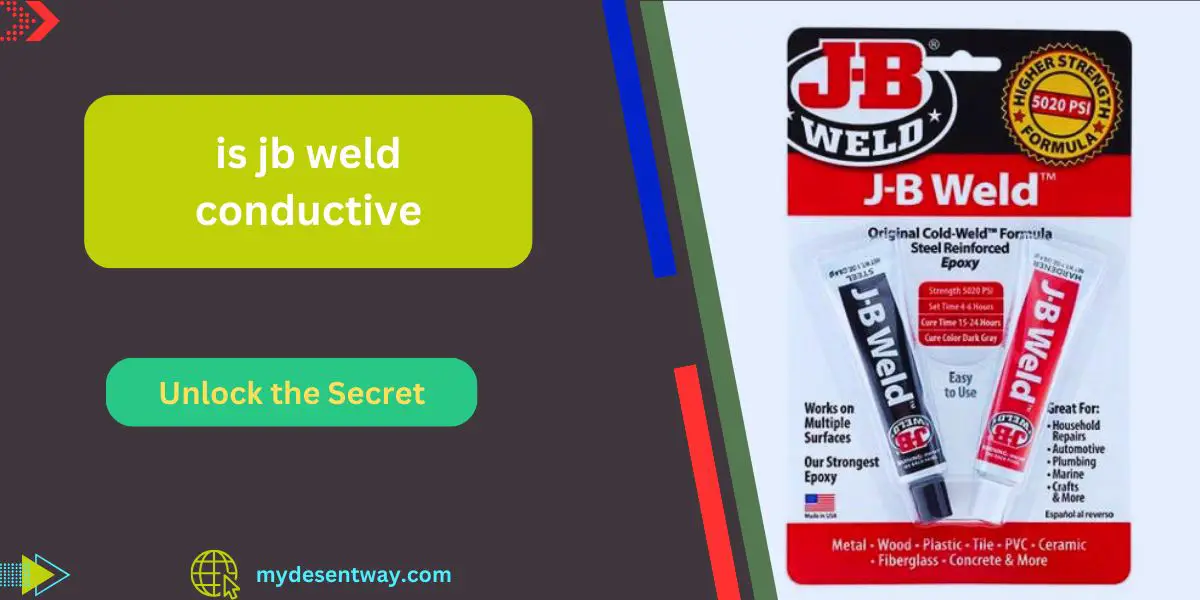Table of Contents
JB Weld is a popular choice for fixing, bonding, and creating with adhesives. However, many wonder: is JB Weld conductive? Whether you’re a DIY enthusiast, a hobbyist, or a professional seeking a dependable adhesive, knowing JB Weld’s electrical conductivity is crucial.
In this article, we’ll explore JB Weld’s conductivity, including its composition, uses, and limitations. So, let’s dive in and reveal the truth about JB Weld’s electrical conductivity! In its standard form, JB Weld is not conductive.
How to Use JB Weld Correctly
Before we delve into its conductivity, let’s first grasp what JB Weld is all about. JB Weld is a two-part epoxy adhesive known for its exceptional bonding strength and versatility.
Comprising a resin and a hardener, this adhesive forms a strong bond when mixed in equal parts. It’s renowned for its ability to bond various materials, including metal, wood, plastic, ceramic, and more.
Composition of JB Weld
JB Weld’s composition plays a pivotal role in determining its electrical conductivity. Understanding its components sheds light on whether it can conduct electricity.
- Resin: The resin component provides adhesion and forms the bulk of JB Weld. It’s typically a polymer substance with insulating properties.
- Hardener: The hardener activates the resin, initiating the curing process. Like the resin, it’s primarily non-conductive.
With its non-metallic composition, JB Weld appears to lean towards being an insulator rather than a conductor. However, the plot thickens as we delve deeper into its conductivity.
Exploring Conductivity
Now, let’s address the elephant in the room: is JB Weld conductive? The answer isn’t a simple yes or no but rather lies in understanding its conductivity under different conditions.
Inherent Conductivity
On its own, JB Weld exhibits minimal conductivity. Its non-metallic composition inherently limits the flow of electrons, making it insulating in nature. However, conductivity isn’t always a binary concept; it exists on a spectrum.
Factors Affecting Conductivity
Several factors influence JB Weld’s conductivity, including:
- Metallic Fillers: Some variants of JB Weld contain metallic fillers, which can enhance conductivity to a certain extent.
- Thickness of Application: Thicker layers of JB Weld may hinder conductivity due to increased insulation.
- Curing Process: Proper curing ensures optimal bonding strength but may also affect conductivity.
Applications Requiring Conductivity
While JB Weld may not be inherently conductive, it finds applications in scenarios where electrical conductivity isn’t a prerequisite. However, for projects demanding electrical conduction, alternative solutions may be necessary.
- Non-Electrical Bonding: JB Weld excels in bonding materials for various non-electrical applications, such as automotive repairs, plumbing fixtures, and household repairs.
- Heat Conduction: In some cases, JB Weld’s thermal conductivity proves beneficial for dissipating heat, but this differs from electrical conductivity.
Conclusion
In conclusion, while JB Weld boasts remarkable bonding strength and versatility, its conductivity remains limited. While it may exhibit minimal conductivity under certain conditions, it’s primarily used for non-electrical applications.
Understanding JB Weld’s properties empowers users to make informed decisions regarding its suitability for their projects. So, the next time you reach for JB Weld, remember its strengths lie in bonding, not conducting electricity!
FAQs about Is JB Weld Conductive?
Is JB Weld Electrically Conductive?
JB Weld itself is not electrically conductive, but certain formulations with conductive fillers can exhibit conductivity.
Can JB Weld Be Used to Repair Electrical Connections?
Yes, JB Weld can be used to repair electrical connections, but it’s essential to ensure that the specific formulation used is conductive.
How Can I Test the Conductivity of JB Weld?
Many individuals want to know the practical method of testing whether JB Weld is conductive or not. This question helps them understand the process of verifying the electrical properties of JB Weld before applying it in electrical projects.
What Types of JB Weld Are Conductive?
With various formulations available in the market, people often search for specific types of JB Weld that exhibit conductivity. Knowing which formulations contain conductive fillers can help users choose the right product for their electrical needs.
Can JB Weld Be Used for Soldering?
Soldering is a common technique in electronics, and some individuals wonder if JB Weld can be used as an alternative to solder for joining electrical components. Understanding the limitations and capabilities of JB Weld in soldering applications is crucial for effective usage.
